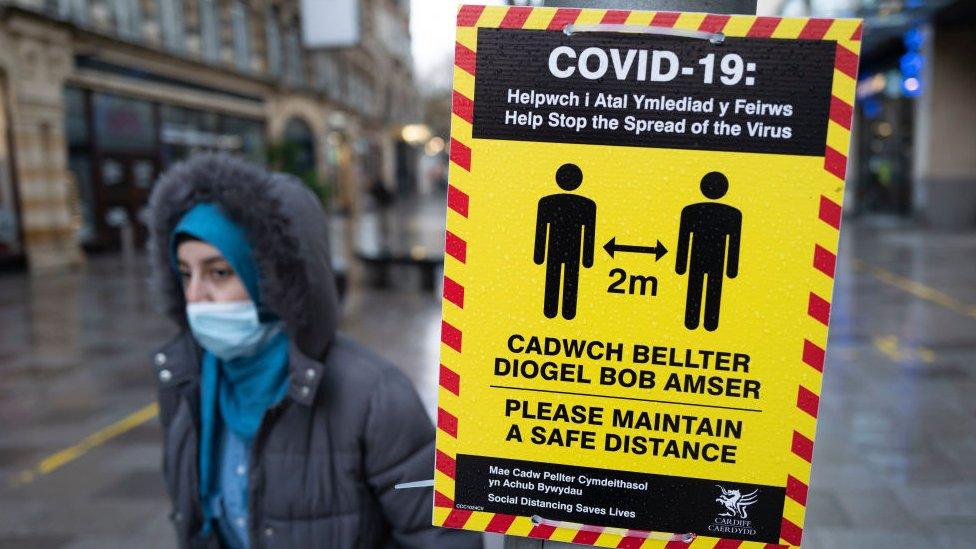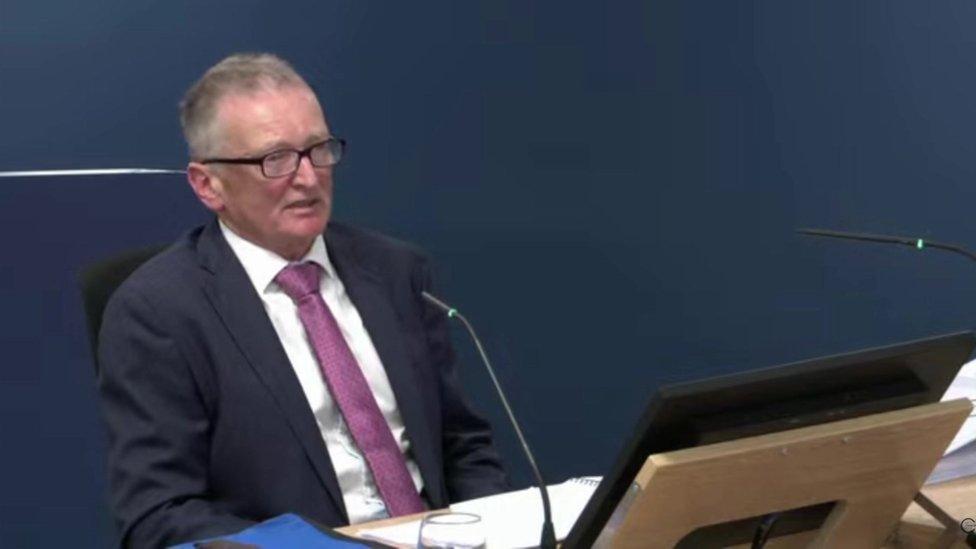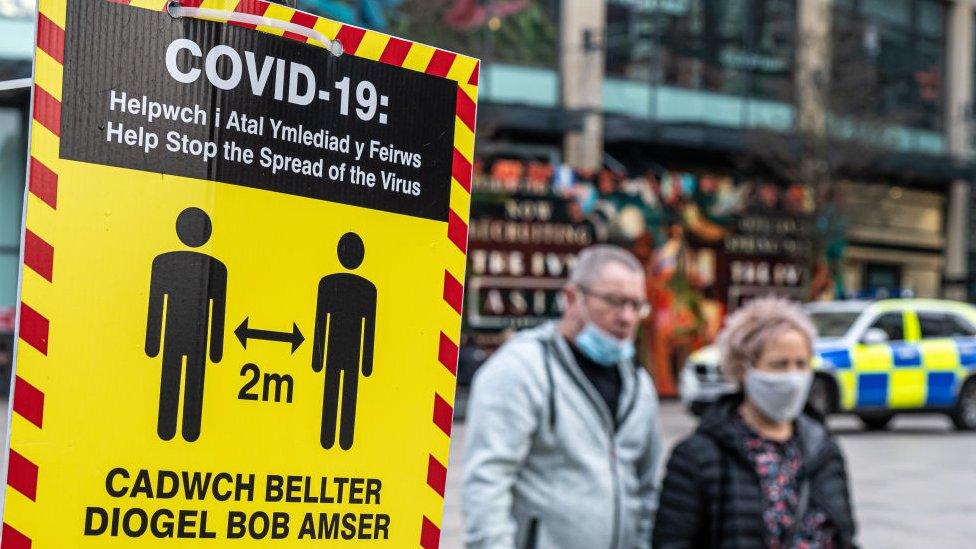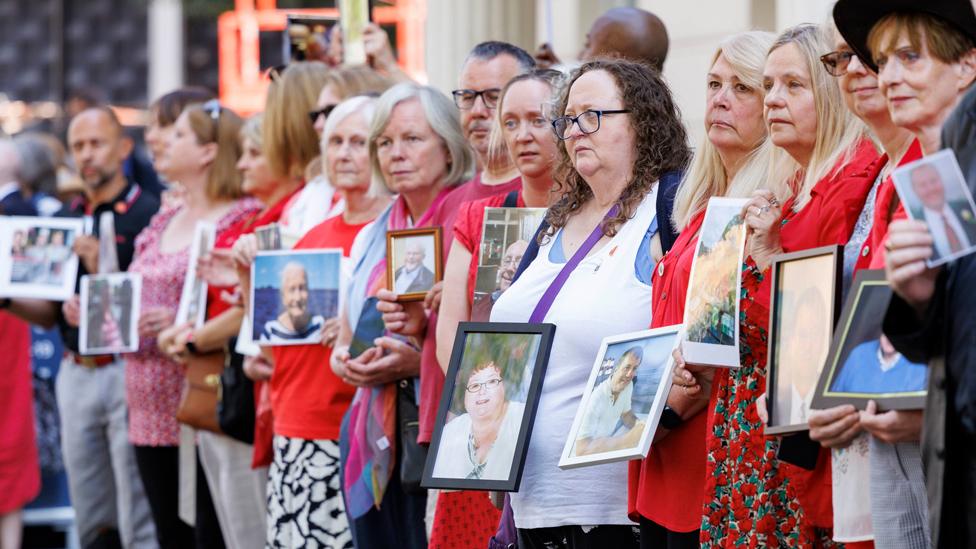No deal Brexit work held up pandemic plans, Welsh official says
- Published

Brexit was said to have affected the planning
Preparations for a no-deal Brexit held up work to plan for a future flu pandemic, Wales' most senior medical adviser has said.
Sir Frank Atherton told the Covid inquiry work "stalled" in the years before the country was hit by Covid.
The chief medical officer said resources had been moved away.
The Welsh government was among the agencies that planned for the UK leaving the EU without a deal. In the end, Brexit happened with an agreement.
Sir Frank also told the hearing in London there had been no debate in government on how to deal with a non-flu pandemic, saying the matter had been "somewhat prematurely dismissed".
A key guidance document on a future pandemic had not been updated since 2011, the inquiry was told, and emails from 2019 showed concern the country was not prepared to deal with a high consequence infectious disease.
Plaid Cymru said "pandemic planning in Wales was seriously inadequate" and Brexit "must not be used as a red herring".
Anne-Louise Marsh-Rees, of the Covid-19 Bereaved Families for Justice Cymru group, said after the hearing that the lack of preparation was "beyond our worst fears".
"Our loved ones did not stand a chance," she said.
The Welsh Conservatives' Russell George said he was worried to hear the "sheer lack of planning and preparedness and the inability for the Welsh Government to think about any possible negative outcomes".
First Minister Mark Drakeford and Health Minister Vaughan Gething will give evidence to the inquiry on Tuesday.

Sir Frank Atherton is the first Welsh official to speak at the Covid inquiry
Tuesday's session was part of a module of the inquiry looking at how prepared the UK was for the pandemic.
Emails from July 2018 revealed that officials had concerns about resources, and that a lack of progress in reviewing pandemic guidance posed a risk to the Welsh government.
The inquiry heard that the Welsh government's Wales pandemic flu preparedness group did not sit again after it met for the last time in September 2018.
At one point, a note from officials went to health minister Vaughan Gething that progress was not as fast "as anticipated".
Sir Frank agreed when lead counsel to the inquiry, Hugo Keith, put it to him that no resources had been committed to pandemic planning, and no further work was done.
"The reason for that, for progress then to stall, was that resources were moved to other issues," Sir Frank said, referring to preparations for a no deal Brexit.
He added: "The work all stalled."
'We should have paid more attention to what if'
A meeting held in September 2017 of the Wales Pandemic Flu Preparedness Group identified a number of "strategic documents" that needed to be changed in light of findings following a flu preparedness exercise, Exercise Cygnus.
Sir Frank said he didn't think any of them were finally updated, suggesting it was a "UK process" that would see them updated.He added that in terms of planning, the strategy was based on a document from 2011 and the planning was "hinging" on a UK group updating that strategy."The master document was seen, and always seen, as the 2011 strategy and everything else seems to be hinging on that," he said. "But there was no updating of strategy documents, it was all hinged on the 2011 strategy update."
Much of the discussion centred on preparations for a pandemic caused by flu.
But Covid was caused by a coronavirus, which behaves differently. Sir Frank told the inquiry there had been no debate on how to deal with a pandemic that was not caused by influenza.
"With the benefit of hindsight we could and should have paid more attention to the 'what if' questions - 'what if the virus was so different," he said.
Measures to tackle such a situation "had been considered and somewhat prematurely dismissed", he said.
The hearing also heard emails from Public Health Wales from 2019 that the country was "not adequately prepared" to deal with high consequence infectious disease.
The emails refer to the two people from west Wales who were low risk contacts of a monkeypox case.
It said there was "some urgent work to be done to provide the necessary assurances that NHS Wales could effectively respond to a case or cases of high consequence infectious disease anywhere in the country".
Sir Frank acknowledged that "highly specialised contained facilities were required on a level that we did not have in Wales" and that he had attempted to strengthen the system.
He told the inquiry his office had been under-resourced when Covid began.
The chief medical officer said it had been "drowning in a sea of information" at the start of the pandemic, and "couldn't even manage emails".
'They did not finish the task'
Dr Andrew Goodall, the permanent secretary of the Welsh government, also gave evidence on Tuesday. He had been chief executive of the Welsh NHS when the Covid outbreak began.
The inquiry heard more than one task and finish groups that had been set up to look at pandemics. Dr Andrew Goodall told the Covid inquiry not all the recommendations they drew up were implemented.
"They were given the task but they didn't finish?" asked Baroness Hallet, who led the inquiry.
"Yes they did not finish the task," he replied.
Plaid Cymru's health spokesman Mabon ap Gwynfor said the evidence "has highlighted significant shortcomings in the Welsh Government's preparedness. Whilst Brexit undeniably took up additional resource the issue must not be used as a red hearing".

Analysis by Hywel Griffith
Wales correspondent, BBC News
For a small nation, it is clear Wales wasn't short of bodies who had a duty to prepare for potential health emergencies ahead of the pandemic.
In the words of the inquiry counsel there was a "plethora" of them at local, regional and national level.
But Wales still was not ready for something like the spread of Covid-19.
In his evidence, the former head of the Welsh NHS Dr Goodall accepted there was "duplication" and "too many arrangements in place".
It was a problem flagged in a report as far back as 2012 with warnings over "confusion" and "fragmentation", leaving Wales less resilient.
The picture emerging from the evidence so far is that officials in Wales were aware of these failings and the need to improve before the pandemic but progress was slow and their attention was focused elsewhere.
- Published13 June 2023

- Published13 June 2023
- Published4 May 2023

- Published13 June 2023
